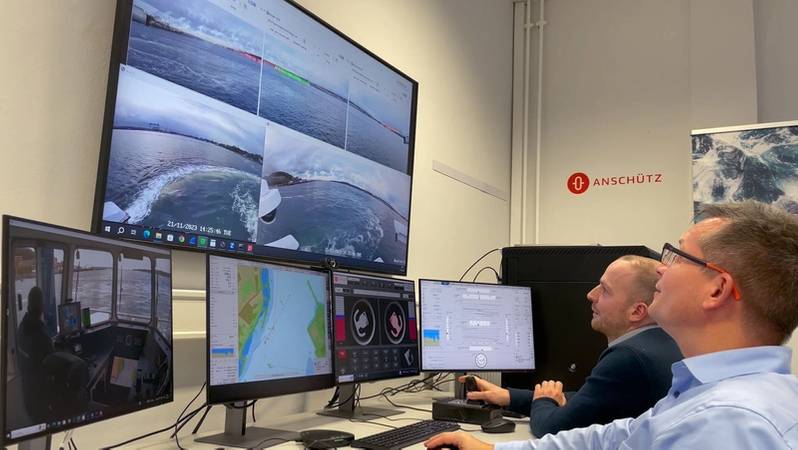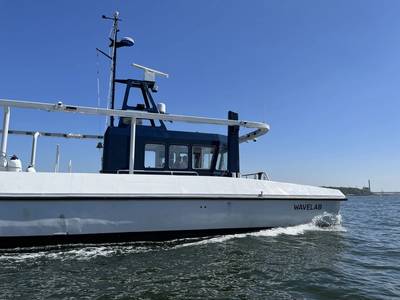Anschütz Advances the Autonomous Bridge System
As part of the Clean Autonomous Public Transportation Network (CAPTN) initiative, Anschütz' research into autonomous systems and assistance systems onboard ships that support navigators has made progress in 2023. In the Remote Operating Centre (ROC) which is set up on land at Anschütz, the MV Wavelab -- a research catamaran that is operating on a maritime test field on the Kiel Fjord in Germany -- is monitored.
Part of the ROC is a complete digital twin with all the data provided by the various existing and experimental sensors and systems on board the Wavelab. Remote control and maneuvering of the ship with full access to the sensor data and the navigation, steering and propulsion systems has been successfully demonstrated under various environmental conditions.
The automation of the Wavelab's control and drive systems is currently being driven forward. The Electronic Chart Display and Information System (ECDIS) and autopilot interact with each other to provide remote control using heading control, as well as largely autonomous driving with the help of track control and speed control. In order to be able to dock automatically in the future, manoeuvrability at low speeds in particular is to be improved in further research trips.
The assistance systems to be developed and tested in the next project phase in 2024 include collision avoidance scenarios calculated on the basis of artificial intelligence and rule- and model-based approaches. A maritime situation analysis in accordance with IMO collision avoidance regulations is to be created using tracks and own ship information. First, a recommendation is to be presented to the user as to whether the course should be maintained, or an evasive manoeuvre is necessary. Then, the system will calculate and display trajectories that can be automated in the long term.
During the project, various sensors will be analyzed in defined scenarios to determine the extent to which they improve situation assessment and, thus, simplify safe navigation and steering. This involves, for example, radar, video and light detection and ranging sensors, devices for bearings and the determination of distances, as well as systems for the automatic detection and classification of objects.
"The research projects within the CAPTN initiative enable us to design and test new ship sensors and systems with partners from the industry and science in a unique real maritime test field for autonomous ships", said Daniel Sommerstedt, Head of Research Projects at Anschütz.
CAPTN's vision is to develop autonomous, safe and sustainable public transport systems. The aim of CAPTN is to connect the eastern and western shores of the Kiel Fjord with autonomous, low-emission passenger ferries. A network of leading companies and universities is developing and researching the necessary technologies in a series of individual projects funded by the German Federal Ministry for Digitalisation and
Transport.
Project partners include Anschütz GmbH, Addix GmbH, the University of Applied Sciences of Kiel, the Christian-Albrechts-Universität zu Kiel (CAU), FuE-Zentrum FH Kiel GmbH, and the Science Center (WiZe) Kiel GmbH.
 Image courtesy Anschütz
Image courtesy Anschütz











